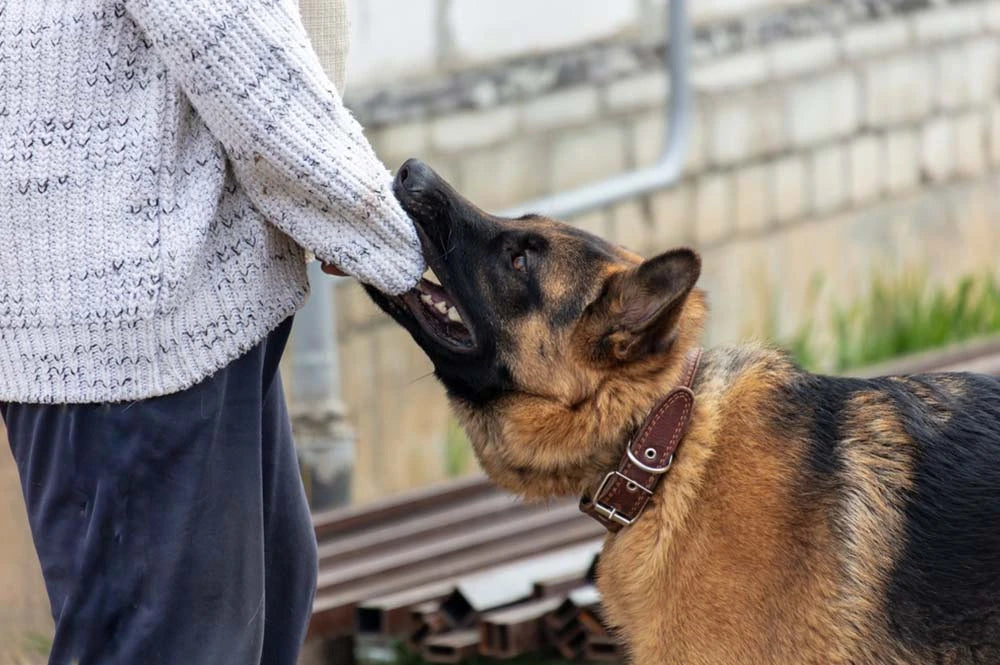Your new pup can be adorable and cuddly, but their teeth can cause a serious punch when they decide to bite you.
Dogs bite around 4.5 million people per year, according to the Centre for Disease Control, and although some dogs are much friendlier than others, all dogs are capable of biting.
Along with a cute and small face, a puppy also comes with 28 razor-sharp teeth that can cause serious damage to humans or other dogs. It is crucial to start positive dog training at the earliest because chewing and play biting that comes with your puppy’s teething can be really problematic if not dealt with at the right time.
In this blog, we will talk about how to stop a dog from biting so that you and your loved ones are well-protected as your furry friend grows.
|
Table of Contents
|
Understanding Why Dogs Bite
Before we get into dog training and behaviour it is important to understand why our dogs bite and act in a certain way.
Have you ever thought to yourself why your dogs nip at you all of a sudden?
More often than not, dogs bite people or other dogs when they feel threatened in some way. It is quite normal and prevalent in almost all domesticated dogs. This is the reason why it becomes very important for any person interacting with a dog to understand what may provoke the dog to act aggressively.
- Your furry buddies are fierce protectors. They may bite to defend themselves, their territory, or their loved ones. This is usually the most common reason behind a dog bite.
- Alarming your dog by waking it up or a sudden approach from your side might also provoke your dog to bite you.
- Illness and injury are also common reasons. Like us humans, even dogs don't like to be bothered when unwell. If your dog isn't feeling very well or is in extreme pain, it might not want to be approached or touched, even by you.
- Your dog will act aggressively if it's in a fearful situation. In such a scenario, your dog will bite anyone who tries to approach it.
Pro Tip: Try to understand your dog’s body language. Your dog might give certain warning signals before they bite you. These signals may be in the form of growling, raising their fur, snapping, a firm posture, or quick tail wagging. Be aware in such cases.
Tips: How To Stop A Dog From Biting
As a canine guardian, you should take responsibility for positive dog training and keeping it under control at all times. You are the first line of defense in preventing most of the dog bites. You should do whatever you can to prevent your dog from biting.
Here are a few tips that we can help you with.
1. Be Informed About Your Dog’s Capabilities
We often misunderstand the capabilities of our furry little babies. As dog parents, you tend to succumb to the misbelief that your dog is well-trained and won't bite. However, it is natural for a dog to bite or act aggressively when frightened. So don't get fooled by their small size and breed. It is important to provide anti-bite training to all dogs.
2. Socialize Your Dog
One of the best ways to stop your dog from biting is by socializing them with as many people and dog friends as possible. Negative attachments or anxiety may be the top reasons behind your dog’s biting problem. Introducing them to more people and situations at a younger age will reduce the possibility of acting aggressively.

Expose your dog to situations such as other dogs, loud machines, noises, or, anything else that might cause fear. Start this at a young age and try to keep the experience more positive.
3. Introduce Reward-Based Training
Dog training for aggressive dogs should always come with positive reinforcements. This is a better way to train your dog rather than punishing them for bad behavior. You can use training treats to reward them. Verbal commands such as “good boy” or “yes” gives reassurance to your dog.

Did you know?
In a 2009 study, it was found that dogs who are punished for their bad behaviour are 25% more aggressive than dogs who are rewarded for good behaviour.
4. Get Your Dog Neutered Or Spayed
Dogs who are spayed or neutered are much more likely to be less aggressive. However, it is not guaranteed that your dog won’t bite, but the altered hormones do calm them down.
5. End Playtime
During playtime, if your dog bites or nips, immediately stop their play. Punishing them in this situation is not advisable. Simply stop playing the game to prove the fact that if they bite, the fun is over. Using clear withdrawal actions will stop your dog from biting.

6. Know Your Dog
If you are a parent to an aggressive dog, then know your dog’s body language very well.
- If your dog is anxious or aggressive around people then consider making them wear a leash while going out for walks.
- Growling is another good signal that your dog might give before biting. Therefore training dogs against growling is not very advisable.
- Raising their fur, wagging their tail rapidly, or a frigid posture might be other indicators that your dog is unhappy and might bite.

As a canine guardian, you need to notice these warning signs and act better.
FAQs: How To Stop Your Dog From Biting: The Ultimate Guide
How to train an aggressive dog?
Dog training for aggressive dogs becomes easier when good behaviour is rewarded. Like children, dogs are conditioned to not act out. Giving them rewards in the form of treats and praises encourages them to behave better.
Should you punish your dog for biting another dog?
No. punishment should be avoided as much as possible. Your dog’s relationship with another dog will never improve if you scold or punish them.
How do you react to a dog’s aggressive behaviour?
It is advisable to calmly and slowly move away from the dog. Never run away from the dog in such situations. This might provoke the dog to charge at you leading to a dog bite.
Conclusion
Teaching your dog to not lash out is not a one-time affair. It needs continued efforts and energy. To really know whether your anti-bite training has worked or not, your dog needs to be exposed to new environments that previously might have caused them to act aggressively or bite.
At Maryam’s Pet, we provide a vast variety of dog toys and treats to reinforce positive dog training.
As we mentioned previously you are the first line of defense in preventing your dog from acting out and biting. So why wait? Start your anti-bite training with your furry babies right away!






